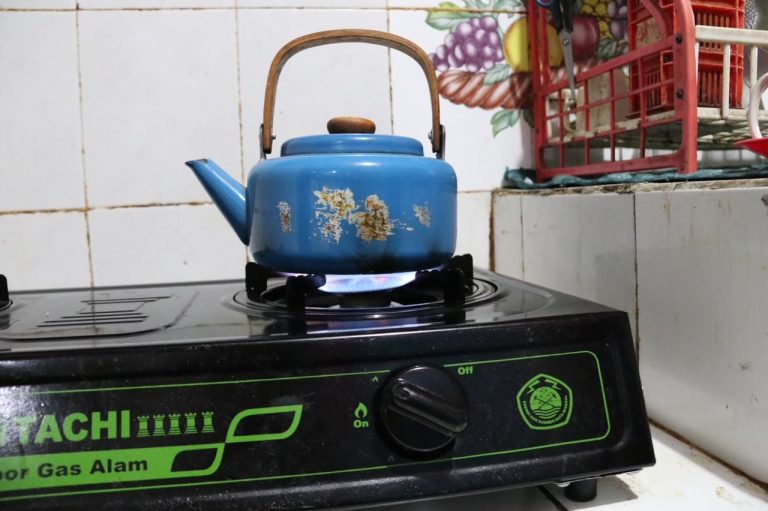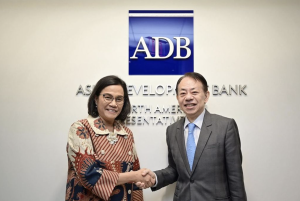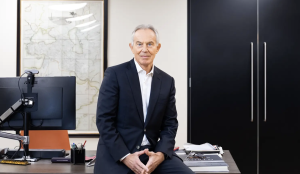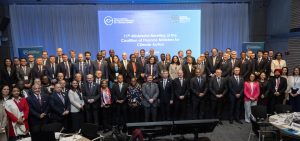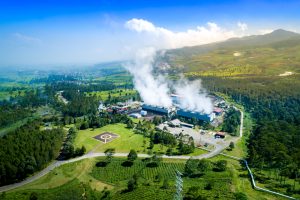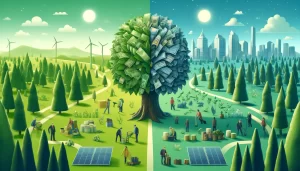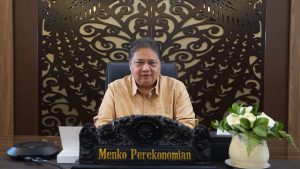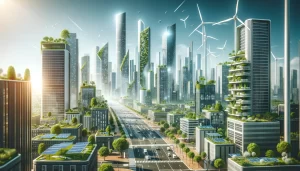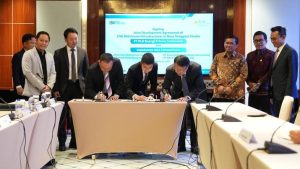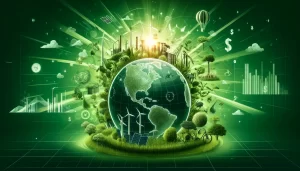by: Hartatik
Nusa Dua, Bali – G20 host Indonesia admits it still needs fossil fuels to meet the country’s energy demand. While the country recognizes the urgency to shift to clean energy sources, the government asserts it is easier said than done. Energy campaigners, however, warn that the continued use of fossil fuels will impede that country’s shift to clean energy.
In Semarang City’s Bojong Salaman Village, households are benefiting from a pipeline network program that supplies them with natural gas. For residents like Grandma Padmi, who sells vegetable dishes for a living, the project means they no longer have to worry about running out of gas any time.
The government’s gas network, known with its acronym Jargas, is one of the programs created to support energy diversification and ensure the utilization of the country’s natural gas supplies.
“The goal of the Jargas development program is to provide access to energy for the community, have a positive impact on the community through saving on natural gas fuel costs, help the community’s economy towards an independent and environmentally friendly community economy and reducing the burden of fuel and/or LPG subsidies on the household sector,” said Risris Risdianto, Commitment Officer for Jargas Semarang City and Blora Regency.
Over 840,000 houses have already been installed with the gas network since the scheme began in 2009 until 2021. Over 660,000 of which were funded through the state budget (APBN)
The program has been made available in 17 provinces and 57 regencies. In 2022, the state reached its target of building nearly 41,000 house connections But the implementation of the program is hitting a snag in parts of the country.
In Sukorejo Village in Bojonegoro District/municipality, some residents complained about paying an allegedly hefty price tag for the natural gas supply.
Gaguk, a resident of the Kadipaten, even had to pay 70,000 rupiah for the gas that was never used at all. He slammed the government for saying the spending for the gas network program would be cheaper than that of three-kilogram LPGs.
Given the limited budget, the state will begin to develop gas networks through the Government and Business Entity Cooperation (GBEC) scheme next year.
Through this scheme, it is hoped that the gas network can be built on a large scale. For one house connection, it will cost around 10 million rupiah.
This year, pilot projects are being carried out in two cities, namely Palembang and Batam, from 13 locations proposed by the Ministry of Energy and Mineral Resources.
“In the future, we hope to build one million house connections per year. But at this time the pilot project used to have hundreds of house connections,” added Tutuka.
The gas network under the GBEC scheme is one of the government’s efforts to contain LPG imports. It is also carried out in a bid to meet the need for sustainable funding, put up a quality and efficient infrastructure, as well as ensure a return on investment through a periodic payment mechanism by the government.
In addition, the use of LNG can also be optimized. As projected, there will be an increase in LNG production by 2028. In the next 10 years, Indonesia will have a gas surplus of up to 1,715 MMSCFD, originating from potential projects in various regions in the country.
Delaying transition to clean energy
Aside from gas networks, other government strategies include using induction cookers as an alternative energy source.However, Executive Director of the Institute for Essential Services Reform Fabby Tumiwa said the government should push for a more focused clean energy roadmap instead.
Coordinator of Greenpeace Indonesia’s Climate and Energy Campaign, Tata Mustasya, said the use of gas by a number of countries is only a distraction in the push for clean energy transition.
“The problem with gas is that this is not a real solution and will delay the actual transition. So if we push for gas, it means that on our side, we will not be able to have zero emission in 2050 because if we build now the gas will still be there 2060-2070,” said Tata.
Tata explained that even though natural gas produces fewer emissions than other fossil fuels, it still has a bad impact on the environment and accelerates the climate crisis.
He called on countries to stop delaying the shift to clean power as the need to address the climate crisis becomes more urgent.
A similar view was expressed by Researcher and Program Manager of Trend Asia Andri Prasetiyo. He said many studies have proven that the use of gas as an energy source can cause countries to depend on dirty energy.
“So instead of being a bridge to connect renewable energy, he instead locks up because of his nature he relatively lulls countries that have already chosen (gas),” said Andri.
He said a number of countries were already comfortable using gas as there is no incentive to make an energy transition.
“Gas also generates methane and it’s also less friendly than carbon dioxide,” he said.
Deputy Executive Director of CEED, Avril de Torres regretted that Southeast Asia, which was called the last bastion, had quickly turned into a center for fossil gas and Asian LNG. Even the government’s electricity company is promoting its massive gas expansion plans under the guise of development.
Moreover, this area is faced with 138 Gigawatts of new gas-fired power plants and 118 LNG terminals, either proposed or already built.
“There is a gas generator that is just in the pre-construction stage with a capacity of 117 Gigawatts in Southeast Asia. This surpasses East Asia by 77 Gigawatts,” said Deputy Executive Director of CEED, Avril de Torres when releasing a special report on ‘High Prices and Expansion of Fossil Gas in Southeast Asia on Monday (14/11).
According to Avril, public and private finance from G20 members such as Japan, the European Union and the US are directing investment in fossil gas and liquefied natural gas (LNG) in the Southeast Asian region the day before the start of the 2022 G20 Summit in Bali.
This information is very relevant to the tweet by the Minister of Finance Sri Mulyani on her Twitter account. Sri Mulyani said that President Joko Widodo (Jokowi) suddenly held a limited meeting with several ministers on the sidelines of preparations for the G20 Summit.
“This morning – in Bali – on the sidelines of preparations for the G20 Summit, President @Jokowi held a limited meeting regarding the gas energy ecosystem and gas price policies for the domestic industry,” said Sri Mulyani via her Instagram account, Wednesday (9/11).
According to Sri Mulyani, this impromptu limited meeting was held considering that the world is currently facing the threat of an energy crisis, especially with the escalation of the Russia-Ukraine war. Therefore, with the large potential of this country’s natural resources, especially gas, according to him, Indonesia should be able to make the right policies to meet national energy needs and also increase the competitiveness of its industry.
“Indonesia, with a wealth of natural resources, must be able to develop appropriate policies to increase national energy security and increase national economic and industrial competitiveness. Moreover, gas is an important source of energy for the Indonesian economy now and in the future,” he concluded.
It should be noted that based on the latest data from the Special Task Force for Upstream Oil and Gas Business Activities (SKK Migas), as of 31 December 2021, Indonesia has proven reserves of natural gas of 34.64 trillion cubic feet (TCF).
This report is part of the G20 fellowship supported by Climate Tracker Asia.
Banner photo: The gas stove is a package of assistance for the gas network program for households from the Ministry of Energy and Mineral Resources. (Source: Doc of the Ministry of Energy and Mineral Resources).

